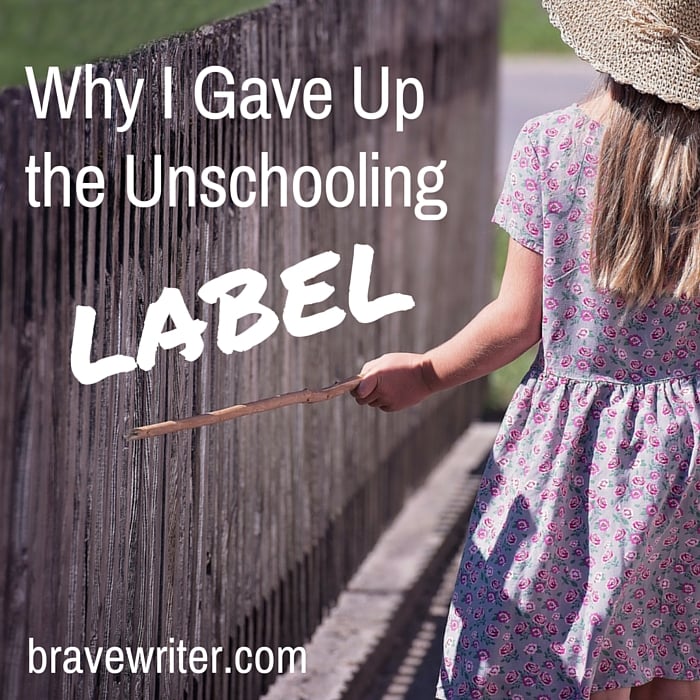
The themes of this week’s email: Help! I want to be more relaxed but then I worry that I’m not doing enough and besides, I know there are requirements for the future that must be met and after all, my kids are struggling with learning issues…. how do I know when to push, when to hold back, when to follow a course of study, when to let kids lead the way with me running along side cheering and supporting? And I had no idea you were such an unschooler.
Let’s start right there. Unschooling.
That word conjures less consensus than the correct waist-height of mid-rise jeans, and generates far more passion.
Pair it with “radical” as in “radical unschooling” and the waistline drops about four inches. And get real. Who can wear low rise jeans after four kids?
That’s pretty much how many moms feel about radical unschooling – Looks sexy, but who can get away with it?
While I love many things about the unschooling philosophy, one thing I don’t love is the label. When the definition of a word becomes more important than the nuances of your particular life, you run the risk of becoming a slave to upholding an ideology rather than a responsive mother. Let me just add that the purists (those who are genuinely committed to an unschooling lifestyle) often are tuned into the nuances of their relationships (which is one easy way to define unschooling in its ideal form).
Unfortunately, to get there, many moms twist themselves into pretzels trying to fulfill an imaginary ideal of unschooling rather than imbibing the philosophy that might change them one bit at a time.
In our home, I’ve given up the labels. They stopped helping me. I felt I was being called on to critique or defend the notion of unschooling rather than being known for how I live with my children. So this morning, with a little time on my hands, let me give you a window into how I see learning and family.
Relational peace is a priority in our home.
That means when a child is in distress, we move to eradicate the source of the stress (we don’t resort to punishment or rewards to overcome it). I take seriously pouting, dawdling, eye-rolling, tears, moodiness, and resistance. These indicate to me that there’s something wrong with the world for that person/child.
My aim is to find out what it is through empathy first. Then we work to create a context that relieves the source. Sometimes that means dropping the day’s activities. Some days it means eating protein before whatever the activity is. Other times it means wading into emotional territory until a level of relief makes it possible to continue with the pre-planned activity. It never means forcing a child to do a task for the sake of “teaching a lesson.”
Learning takes two.
While relaxed, eclectic and un-schoolers all promote the idea that a child’s interests make for the best learning opportunities, I’ve also found that a parent’s personal educational trajectory is equally important to the family lifestyle of learning. Too often moms spend a lot of energy trying to figure out what their children want to learn (wringing their hands hoping a “real” interest pops up) while they themselves have no idea what they would enjoy knowing or learning. Whenever a mom expresses anxiety over her kids, I suggest she take up knitting. 🙂 Really. Pick a hobby, area of study, or latent curiosity and pursue it with genuine vigor (even if it takes away from your homeschool schedule).
Live your interests before your kids. Watch the DVDs of the “Story of Painting” right in the middle of your homeschool day, listen to the Lord Peter Wimsey books on CD while making lunch, set up the easel in your dining room and paint during the afternoons while your kids play the X box, hang bird feeders and count the birds that come to your backyard for Project Feederwatch. Be an interested learner with passion for life and your kids will benefit from the run-off.
Drop what you can; do what you must.
One challenge for those wanting a more relaxed lifestyle is that when moms squelch their anxiety and let go of the reins, they freak out a few weeks later when it looks like their kids are laying around with the TV remote and not doing anything of observable value.
Let’s apply “one-thing” to this scenario. Let go of one thing at a time. If up until now your kids throw hissy fits over a particular practice (workbook, math drill, grammar lesson, sitting in the kitchen rather than lounging on the couch), let one of those go. Just drop it. You can always come back to it.
Today – say to your kids, “We’re putting math away for awhile since it’s going poorly.” By the same token, if you feel concerned about grammar, turn that concern into practical action. Focus on it. Find ways to make it meaningful. Become the student of grammar you hope your kids will be. Incorporate it into all of your lives through conversation, observation, identifying typos, reading a humorous grammar book, practicing sentences in a foreign language, playing grammar games.
Both attitudes matter. You can let go of what is trying and embrace what causes you anxiety. The letting go may even be temporary and the embracing may turn out to be easily satisfied. In both cases, you are honoring the emotional temperature of your family. Pay attention to both your kids (what they need, hate, love, want, cry about, resist, crave) and to yourself (what you fear, need to satisfy, hope, wish, imagine, overemphasize). Somewhere between these two is an education that you will find satisfies you both.
Drop the lingo. Unschooling is just one more word. Focus instead on reality in your home.




















